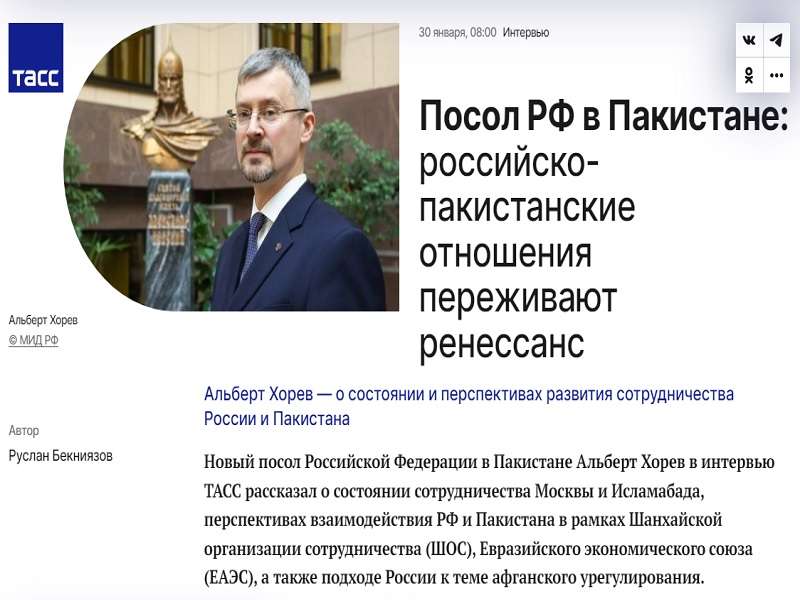Newly appointed Russian Ambassador to Pakistan Albert Khorev, who earlier headed the Afghan Division of the Russian Foreign Ministry’s Second Department alongside serving as Deputy Foreign Minister, just gave an interview to TASS about bilateral ties. It follows his newly appointed Pakistani counterpart Muhammad Khalid Jamali’s interview with them from late November that was analyzed here at the time. The present piece will summarize and then analyze Ambassador Khorev’s insight within this context.
He began by informing readers about high-level bilateral contacts in recent months, the likelihood of reaching a record $1 billion in mutual trade (mostly driven by Russian agricultural exports) by the end of the year, and ongoing talks over the Pakistan Stream gas pipeline. About the last-mentioned, Ambassador Khorev noted that energy is a promising avenue of cooperation but was mum on the details of Pakistan’s Russian imports and very vague about the progress of the aforementioned pipeline talks.
On the multilateral level, he confirmed that Russia and Pakistan have close positions on most global issues, countering unconventional threats like terrorism and drug crimes, and regional connectivity, all of which are within the ambit of the SCO whose Heads of State Council is chaired by Pakistan this year. As for ties with the Eurasian Economic Union, member state Armenia with whom Pakistan doesn’t have any relations has a veto on this per the group’s consensual agreement format, but workarounds are possible.
Ambassador Khorev was also asked about Pakistan’s publicly expressed interest in joining BRICS, to which he responded noncommittally as expected by reminding his interlocutor that this group also makes decisions by consensus in an allusion to India’s predictable veto on its rival’s membership bid. The interview then wrapped up with a few perfunctory words about how these two cooperate on Afghanistan and expressing hopes that bilateral ties will continue growing.
He said all the right things just like his Pakistani counterpart did a little more than two months prior, but left unsaid by both is the fact that neither of their personal wills to comprehensively expand relations and accelerate the pace of that which has already been achieved is sufficient to make this happen. The prerogative rests solely with Chief Of Army Staff (COAS) Asim Munir, who’s widely considered to run the country behind the scenes per the role that the men in his top military post have traditionally played.
His and his predecessor’s pro-US alignment are why not much has come out of their energy talks over the past two years since the post-modern coup against former Prime Minister Imran Khan in April 2022, who was just sentenced to ten years in prison for allegedly leaking state secrets about the aforesaid plot. To be sure, they still autonomously cultivated a degree of mutually beneficial ties with Russia and relations are better than they’ve been in years, but they also reportedly passed along arms to Ukraine.
It’s in Pakistan’s objective national interests to diversify its energy suppliers, but the US would prefer to keep it tied to Qatari LNG and Saudi oil, the implied demand of which COAS Munir and his predecessor Qamar Javed Bajwa dutifully complied with. There’s also the problem of troubled Pakistani-Iranian ties following mid-January’s tit-for-tat strikes that Iran came out on top of despite their subsequent rapprochement, which impedes Russian-Pakistani trade via the North-South Transport Corridor.
These factors combine to greatly reduce the chances that Ambassador Jilani and Khorev’s joint vision of comprehensively expanding mutually beneficial ties will enter into fruition anytime soon, but the silver lining is that the hard-earned progress achieved thus far nevertheless wasn’t reversed. These two diplomats are therefore expected to continue trying their utmost to slowly but surely take their countries’ relations to the next level, but it’ll ultimately depend on what COAS Munir decides to do.
